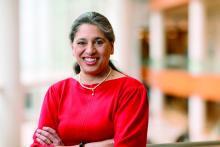User login
, according to a Swedish nationwide cohort study.
Reduced fertility was linked with histologic inflammation even in the absence of clinical disease activity, highlighting the importance of achieving deep remission in women planning pregnancy, reported lead author Karl Mårild, MD, PhD, of Sahlgrenska Academy, Gothenburg, Sweden, and colleagues.
“Reduced female fertility (ie, number of live births) is believed to be primarily confined to women with clinically active IBD, especially in Crohn’s disease (CD), where symptoms may inhibit sexual activity, and inflammation may affect the fallopian tubes and ovaries,” the investigators wrote in Gastroenterology. “Despite the increasing appreciation of histologic activity in IBD, its association with female fertility has not been clarified, including whether histologic activity in the absence of clinical disease activity impairs fertility.”
Dr. Mårild and colleagues aimed to address this knowledge gap by analyzing fertility rates and histologic inflammation or IBD activity in two cohorts of women with IBD aged 15-44 years. The first group included approximately 21,000 women with and without histologic inflammation from 1990 to 2016. The second group included approximately 25,000 women with or without IBD clinical activity from 2006 to 2020. In each group, the relationship between fertility and IBD was compared with fertility in matched general population comparator individuals.
This approach showed that clinical IBD activity was associated with an adjusted fertility rate ratio (aFRR) of 0.76 (95% CI, 0.72-0.79), which equates to one fewer child per six women with 10 years of clinical activity. Impacts on fertility were similar for UC (aFRR, 0.75) and CD (aFRR, 0.76).
“Fertility rates were notably reduced during periods of clinical IBD activity and, contrary to a generally accepted belief, equally reduced in clinically active UC and CD,” the investigators wrote. “Besides inflammation, clinically active IBD may reduce fertility through psychological mechanisms (eg, depression), dyspareunia (especially in perianal CD), bowel pain, urgency, and other symptoms that hinder sexual activity.”
Compared with histologic remission, histologic inflammation was also associated with reduced fertility (aFRR, 0.90). This means that in periods of histologic inflammation, 6.35 live births occurred per 100 person-years of follow-up, compared with 7.09 lives births for periods of histologic remission. This amounts to one fewer child per 14 women with 10 years of histologic inflammation.
Finally, the study revealed that, in women with clinically quiescent IBD, those with histologic inflammation had significantly reduced fertility, compared with those in histologic remission (aFRR, 0.85). This association persisted after controlling for contraceptive use.
“Even if histologic inflammation was associated with an overall modest fertility reduction … its impact on the individual might be substantial, with potential ramifications beyond reproductive health, given that reduced female fertility is linked to poor quality of life and mental health,” Dr. Mårild and colleagues wrote. “At a societal level, involuntary childlessness causes high and increasing costs, highlighting the need to focus on preventable causes of reduced fertility.”
The investigators suggested that inflammation may be driving infertility by reducing ovulation and fertilization, or by reducing endometrial receptivity, which increases risk of pregnancy loss.
“This is the first study, to our knowledge, to show reduced fertility during histologic inflammation in IBD compared to histologic remission,” the investigators wrote. “Our findings suggest that achieving histologic remission may improve the fertility of women with IBD, even in the absence of clinically defined disease activity.”
The investigators disclosed relationships with AbbVie, Pfizer, Janssen, and others.
The importance of controlling inflammation to ensure a healthy pregnancy cannot be overstated. With regard to fertility, the literature has emphasized that surgery has been the major risk factor for decreasing fertility in both ulcerative colitis and Crohn’s disease. Disease activity has been more influential on Crohn’s disease versus ulcerative colitis. Other factors such as voluntary childlessness, premature ovarian failure, and malnutrition can also play a role. There have been data to show that anti–tumor necrosis factor use increases the chances of successful implantation for women with sub-fertility who do not have concomitant IBD, perhaps by decreasing inflammation in the pelvis.
Sunanda Kane, MD, MSPH, AGAF, is based in the Division of Gastroenterology and Hepatology, Mayo Clinic, Rochester, Minnesota. She reports serving as a consultant to Boehringer Ingelheim, Bristol Myers Squibb, Fresenius Kabi, Gilead, Janssen, and Takeda. She is also Section Editor for IBD for UptoDate.
The importance of controlling inflammation to ensure a healthy pregnancy cannot be overstated. With regard to fertility, the literature has emphasized that surgery has been the major risk factor for decreasing fertility in both ulcerative colitis and Crohn’s disease. Disease activity has been more influential on Crohn’s disease versus ulcerative colitis. Other factors such as voluntary childlessness, premature ovarian failure, and malnutrition can also play a role. There have been data to show that anti–tumor necrosis factor use increases the chances of successful implantation for women with sub-fertility who do not have concomitant IBD, perhaps by decreasing inflammation in the pelvis.
Sunanda Kane, MD, MSPH, AGAF, is based in the Division of Gastroenterology and Hepatology, Mayo Clinic, Rochester, Minnesota. She reports serving as a consultant to Boehringer Ingelheim, Bristol Myers Squibb, Fresenius Kabi, Gilead, Janssen, and Takeda. She is also Section Editor for IBD for UptoDate.
The importance of controlling inflammation to ensure a healthy pregnancy cannot be overstated. With regard to fertility, the literature has emphasized that surgery has been the major risk factor for decreasing fertility in both ulcerative colitis and Crohn’s disease. Disease activity has been more influential on Crohn’s disease versus ulcerative colitis. Other factors such as voluntary childlessness, premature ovarian failure, and malnutrition can also play a role. There have been data to show that anti–tumor necrosis factor use increases the chances of successful implantation for women with sub-fertility who do not have concomitant IBD, perhaps by decreasing inflammation in the pelvis.
Sunanda Kane, MD, MSPH, AGAF, is based in the Division of Gastroenterology and Hepatology, Mayo Clinic, Rochester, Minnesota. She reports serving as a consultant to Boehringer Ingelheim, Bristol Myers Squibb, Fresenius Kabi, Gilead, Janssen, and Takeda. She is also Section Editor for IBD for UptoDate.
, according to a Swedish nationwide cohort study.
Reduced fertility was linked with histologic inflammation even in the absence of clinical disease activity, highlighting the importance of achieving deep remission in women planning pregnancy, reported lead author Karl Mårild, MD, PhD, of Sahlgrenska Academy, Gothenburg, Sweden, and colleagues.
“Reduced female fertility (ie, number of live births) is believed to be primarily confined to women with clinically active IBD, especially in Crohn’s disease (CD), where symptoms may inhibit sexual activity, and inflammation may affect the fallopian tubes and ovaries,” the investigators wrote in Gastroenterology. “Despite the increasing appreciation of histologic activity in IBD, its association with female fertility has not been clarified, including whether histologic activity in the absence of clinical disease activity impairs fertility.”
Dr. Mårild and colleagues aimed to address this knowledge gap by analyzing fertility rates and histologic inflammation or IBD activity in two cohorts of women with IBD aged 15-44 years. The first group included approximately 21,000 women with and without histologic inflammation from 1990 to 2016. The second group included approximately 25,000 women with or without IBD clinical activity from 2006 to 2020. In each group, the relationship between fertility and IBD was compared with fertility in matched general population comparator individuals.
This approach showed that clinical IBD activity was associated with an adjusted fertility rate ratio (aFRR) of 0.76 (95% CI, 0.72-0.79), which equates to one fewer child per six women with 10 years of clinical activity. Impacts on fertility were similar for UC (aFRR, 0.75) and CD (aFRR, 0.76).
“Fertility rates were notably reduced during periods of clinical IBD activity and, contrary to a generally accepted belief, equally reduced in clinically active UC and CD,” the investigators wrote. “Besides inflammation, clinically active IBD may reduce fertility through psychological mechanisms (eg, depression), dyspareunia (especially in perianal CD), bowel pain, urgency, and other symptoms that hinder sexual activity.”
Compared with histologic remission, histologic inflammation was also associated with reduced fertility (aFRR, 0.90). This means that in periods of histologic inflammation, 6.35 live births occurred per 100 person-years of follow-up, compared with 7.09 lives births for periods of histologic remission. This amounts to one fewer child per 14 women with 10 years of histologic inflammation.
Finally, the study revealed that, in women with clinically quiescent IBD, those with histologic inflammation had significantly reduced fertility, compared with those in histologic remission (aFRR, 0.85). This association persisted after controlling for contraceptive use.
“Even if histologic inflammation was associated with an overall modest fertility reduction … its impact on the individual might be substantial, with potential ramifications beyond reproductive health, given that reduced female fertility is linked to poor quality of life and mental health,” Dr. Mårild and colleagues wrote. “At a societal level, involuntary childlessness causes high and increasing costs, highlighting the need to focus on preventable causes of reduced fertility.”
The investigators suggested that inflammation may be driving infertility by reducing ovulation and fertilization, or by reducing endometrial receptivity, which increases risk of pregnancy loss.
“This is the first study, to our knowledge, to show reduced fertility during histologic inflammation in IBD compared to histologic remission,” the investigators wrote. “Our findings suggest that achieving histologic remission may improve the fertility of women with IBD, even in the absence of clinically defined disease activity.”
The investigators disclosed relationships with AbbVie, Pfizer, Janssen, and others.
, according to a Swedish nationwide cohort study.
Reduced fertility was linked with histologic inflammation even in the absence of clinical disease activity, highlighting the importance of achieving deep remission in women planning pregnancy, reported lead author Karl Mårild, MD, PhD, of Sahlgrenska Academy, Gothenburg, Sweden, and colleagues.
“Reduced female fertility (ie, number of live births) is believed to be primarily confined to women with clinically active IBD, especially in Crohn’s disease (CD), where symptoms may inhibit sexual activity, and inflammation may affect the fallopian tubes and ovaries,” the investigators wrote in Gastroenterology. “Despite the increasing appreciation of histologic activity in IBD, its association with female fertility has not been clarified, including whether histologic activity in the absence of clinical disease activity impairs fertility.”
Dr. Mårild and colleagues aimed to address this knowledge gap by analyzing fertility rates and histologic inflammation or IBD activity in two cohorts of women with IBD aged 15-44 years. The first group included approximately 21,000 women with and without histologic inflammation from 1990 to 2016. The second group included approximately 25,000 women with or without IBD clinical activity from 2006 to 2020. In each group, the relationship between fertility and IBD was compared with fertility in matched general population comparator individuals.
This approach showed that clinical IBD activity was associated with an adjusted fertility rate ratio (aFRR) of 0.76 (95% CI, 0.72-0.79), which equates to one fewer child per six women with 10 years of clinical activity. Impacts on fertility were similar for UC (aFRR, 0.75) and CD (aFRR, 0.76).
“Fertility rates were notably reduced during periods of clinical IBD activity and, contrary to a generally accepted belief, equally reduced in clinically active UC and CD,” the investigators wrote. “Besides inflammation, clinically active IBD may reduce fertility through psychological mechanisms (eg, depression), dyspareunia (especially in perianal CD), bowel pain, urgency, and other symptoms that hinder sexual activity.”
Compared with histologic remission, histologic inflammation was also associated with reduced fertility (aFRR, 0.90). This means that in periods of histologic inflammation, 6.35 live births occurred per 100 person-years of follow-up, compared with 7.09 lives births for periods of histologic remission. This amounts to one fewer child per 14 women with 10 years of histologic inflammation.
Finally, the study revealed that, in women with clinically quiescent IBD, those with histologic inflammation had significantly reduced fertility, compared with those in histologic remission (aFRR, 0.85). This association persisted after controlling for contraceptive use.
“Even if histologic inflammation was associated with an overall modest fertility reduction … its impact on the individual might be substantial, with potential ramifications beyond reproductive health, given that reduced female fertility is linked to poor quality of life and mental health,” Dr. Mårild and colleagues wrote. “At a societal level, involuntary childlessness causes high and increasing costs, highlighting the need to focus on preventable causes of reduced fertility.”
The investigators suggested that inflammation may be driving infertility by reducing ovulation and fertilization, or by reducing endometrial receptivity, which increases risk of pregnancy loss.
“This is the first study, to our knowledge, to show reduced fertility during histologic inflammation in IBD compared to histologic remission,” the investigators wrote. “Our findings suggest that achieving histologic remission may improve the fertility of women with IBD, even in the absence of clinically defined disease activity.”
The investigators disclosed relationships with AbbVie, Pfizer, Janssen, and others.
FROM GASTROENTEROLOGY


